
People Also Ask Tips For Local SEO
Now that "People Also Ask" (PAA) questions are aggregated within your SERPWoo projects you can find hidden gems to help you create new and updated content.
Using our example let's say you got an Orthodontist, a dentist that puts on braces, as a client, within your project you've got a list of all the keywords they are going after locally. Since it's a local SEO project you'll get gems like these:
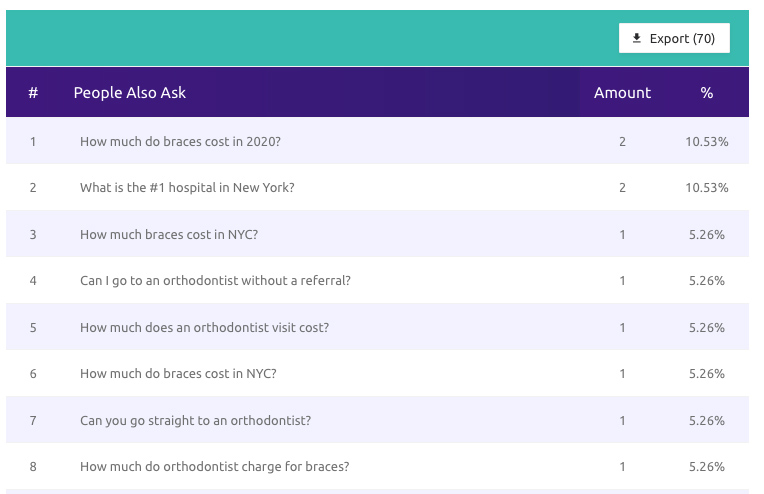
The beauty is that the project is aggreted for NYC, so we get real world topics that users within the location are using
I will note that particular "2020" People Also Ask stopped ranking April 15th, long into 2021, which makes you wonder about Google... So here you can still see that even though it's 2021 Google is still bringing up suggestions for 2020. Time for some content upgrades.
After April 15th, this particular PAA updated to this, without the 2020 year date:
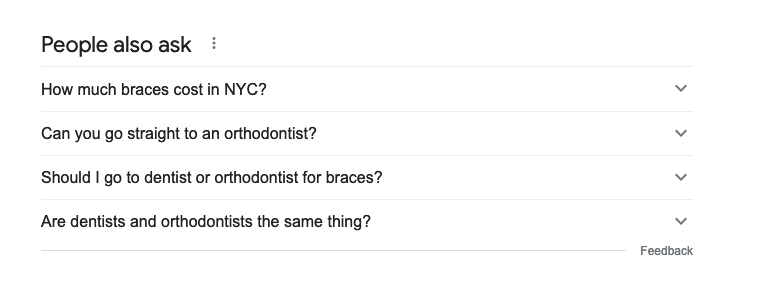
According to our friends at SEMRush, search queries that start with question words such as "Who", "What", "When", "Where", "Why", and "How" trigger PAA boxes 86% of the time (Source: How To Maximize ‘People Also Ask’ SEO Opportunities).
Search queries with 6-10+ words trigger PAA 49% to 73% of the time.
Google seems to be looking to help users by either redefining the question based on past search queries or get a deeper understanding of the user's intent.
Previously I showed how you can take advantage of "People Also Ask" Questions by taking over competitors terms while having a weak domain - basically sliding into the SERPs that would normally be blocked off for weaker domains. Now couple that with using highlighted terms to increase the relevancy within your content and you start seeing the missing pieces and generating new content ideas.
Several times the content doesn't need to be all that new, just updated with more relevant information. In that scenario you keep your power from aged backlinks already created AND give Google that "Freshness" factor it's always salavating for.
Google Trends For Local SEO
One of the less known secrets of Google Trends is that you can localize results down to the city level. Google trends then turns into a great source for comparing keywords and doing research at the local level. Example:
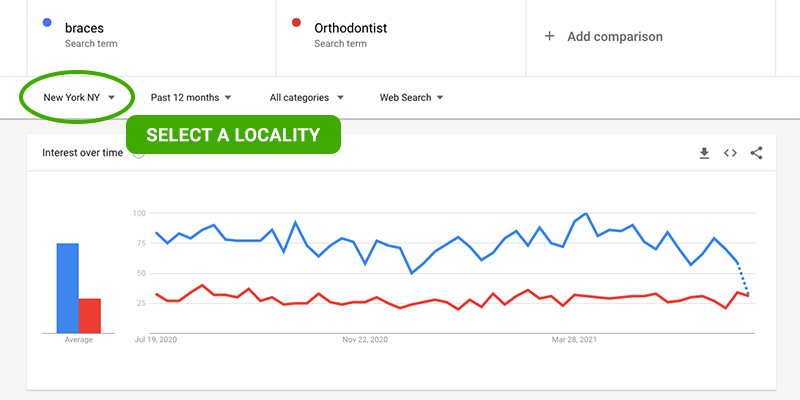
Scroll a little further and you can get ideas for content and learn more about your local SEO client's topics:
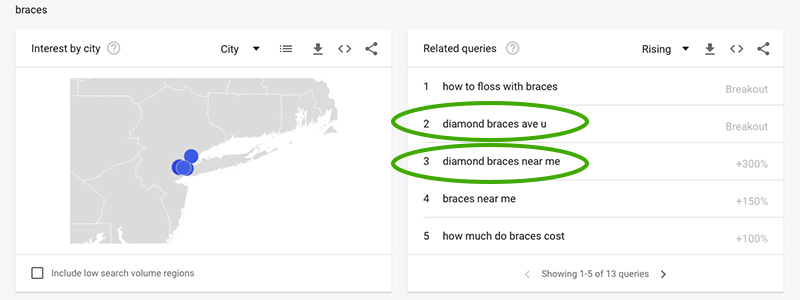
I didn't know what "diamond braces" were so I Google it. I thought it was some hip-hop reference but turns out that it's a brand that's local to New York, but they are also a type of braces made from stainless steel and smaller than traditional metal braces. This is all information that your client might know but you as the SEO/marketer might be oblivious to. AND these particular SERPs have PAA!!
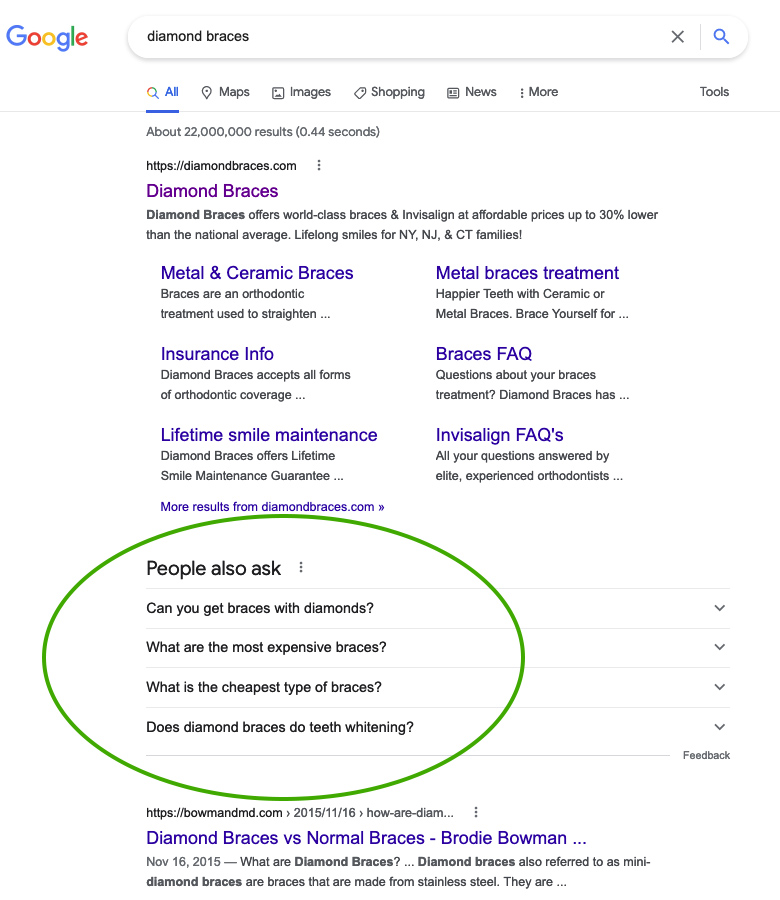
So now i know some newer topics to go after like "diamond braces in NYC". Another potential topic is "how to floss with braces" (probably no locality needed unless New Yorkers do something vastly different in their flossing technique).
RelatedWords.org For Local SEO
This is a great secret SEO resource: RelatedWords.org. Type in a keyword and you'll get a simple list of related keywords. This gem will definitely help with content and topic ideas. Screenshot:
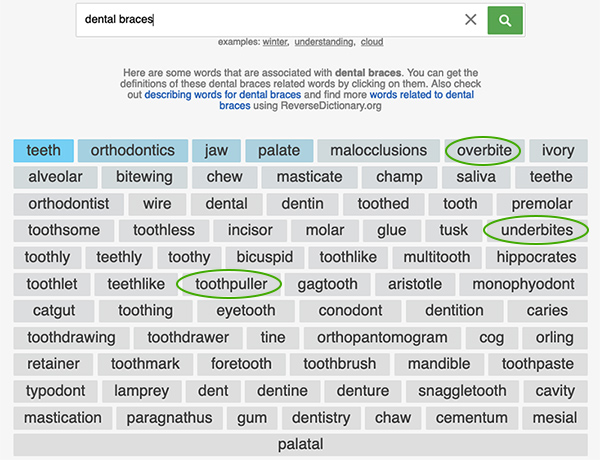
Going along the lines of local SEO you see ideas like "underbites", "overbite" - again these are things your client, our dentist in this example, know of but aren't going to necessarily relay to you as the SEO/marketer. However I am a bit concerned with the "toothpuller" keyword - sounds like an ouch...
You can then take those terms, "underbite" and "overbite", and thrown them into Google Trends, while setting the location to New York City, New York, to see which topics are more popular in the area. Screenshot:
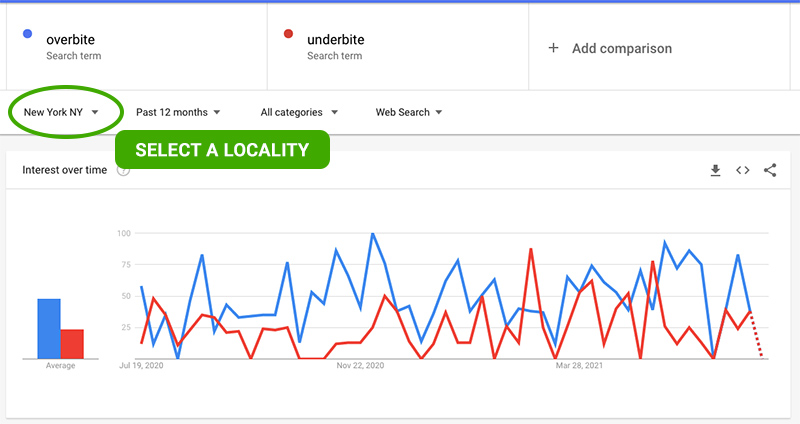
"Overbite" is definitely the winner there. Putting this term at the top of your topic list to write content for since there is more interest overtime when comparing with "Underbite."
Then Google each term with the a location variable, example "underbites NYC":
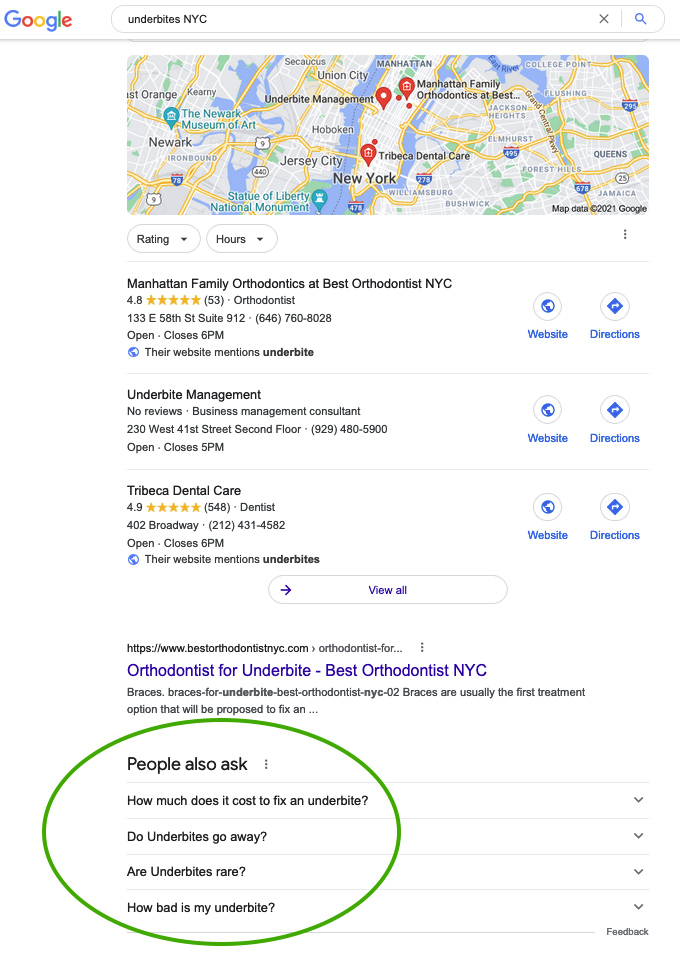
We see more PAA examples at the #2 position in organic. With each keyword term you can get further ideas for your content strategy to take over your local market for your client.
How To Take Action
For our Orthodontist here are the steps I use:
1st step is to export all the "People Also Ask" questions from the project.
2nd step, look for the questions that come up the most within your project's keywords. The more keywords you have the more fishes you'll catch in your net (fishing anology - instead of fishing with rods we are fishing with nets across the river). Local SEO is more concentrated on how you gain backlinks and source SEO traffic - so you don't need much to take over whole niches if you do this correctly.
3rd step, write out a content piece specifically targeting a PAA question and publish it to a blog post. If you can get away with updating a blog post even better. In the 2020 versus 2021 example you can see how simply updating a 2020 article (without updating the URL like Wordpress sometimes likes to do) you'll be able to retain the backlinks without needing a redirect which means backlinks will not lose about 15% of their power.
Here I would do my research with Google Trends and RelatedWords to find additional topics and create a 30 day content calendar publishing blogposts for my local client. In our case I would go after "Overbite" content pieces first since more people are researching that term versus others. Go after the low hanging-fruit by going after terms more searchers are looking for.
4th Step, after publishing an article, use popular hashtags and post the article to social media. The reason for the popular hashtags is because Google indexes popular hashtags like "#Health" and "#Smile", and you're content will get indexed faster. The second reason is your social media accounts will send brand signals to Google about the new content, and get your PAA articles ranking faster!
Some of you may be familiar with this method of getting pages indexed faster and ranking faster, I talk about it in the SEO Avalanche technique thread at Builder Society. The real crazy part is, if you use the SEO Avalanche technique on local SEO clients you'll almost never need to get strong backlinks because the competitors have pretty much zero backlinks if any at all - at least to their blog posts.
The landscape is still open - unless you are in a major city or region, or going after short-tailed versions of PAA questions.
Log in to view your newest PAA data for your projects: View All My Projects
Have any questions? Ask away in the comments!
- CCarter
